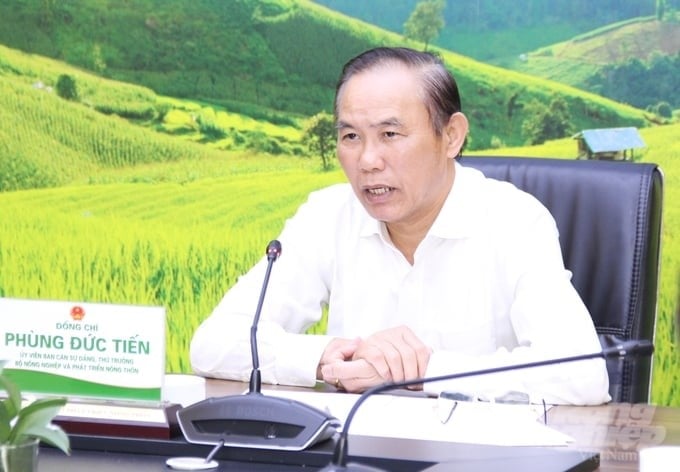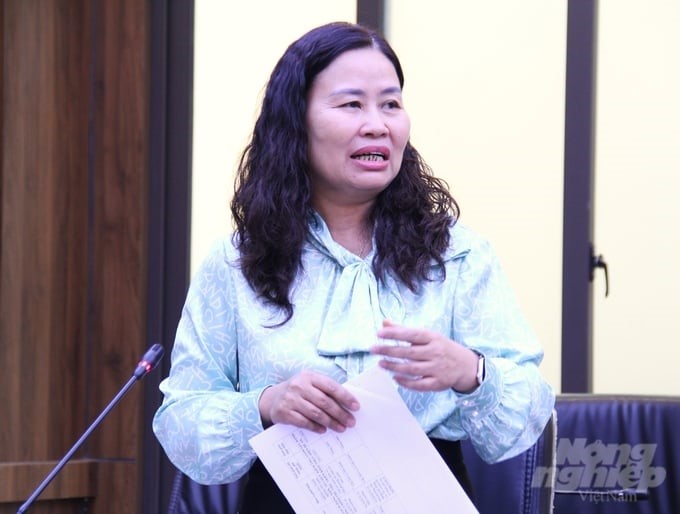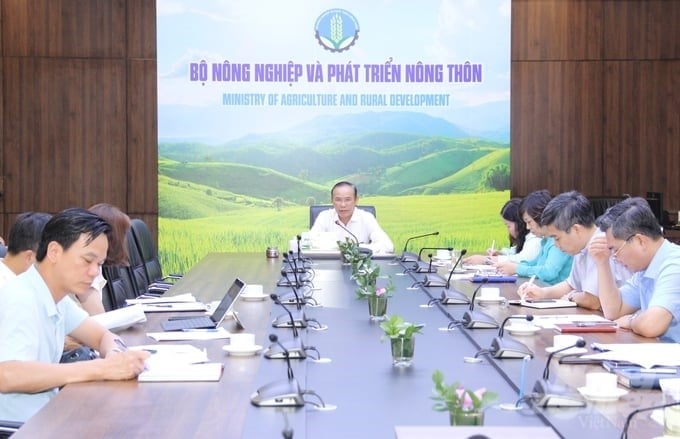May 30, 2025 | 06:12 GMT +7
May 30, 2025 | 06:12 GMT +7
Hotline: 0913.378.918
May 30, 2025 | 06:12 GMT +7
Hotline: 0913.378.918
According to the Science, Technology and Environment Department (Ministry of Agriculture and Rural Development – MARD), the Project's goal is to develop the bio-industry with high added value, sustainability, and eco-friendliness to serve agricultural economic development; enhance the potential of research, development, application, and mastery of modern biotechnology in the region and the world. Bring Vietnam into a country with a biotechnology level on par with advanced countries in the region and the world.

Deputy Minister of Agriculture and Rural Development Phung Duc Tien noted that the Project Executive Committee and related units must identify key tasks for each stage and focus on completing them to create a premise and motivation for the next stage. Photo: Trung Quan.
Main tasks include: developing science and technology to serve the agricultural bio-industry; building and developing the potential of the agricultural bio-industry. Developing and perfecting the system of legal normative documents, mechanisms, and policies to promote the development of agricultural bio-industry; international cooperation in the field of agricultural bio-industry; and communication to raise awareness about agricultural bio-industry.
The Prime Minister has assigned MARD to preside and coordinate with relevant ministries, branches, and localities to organize the implementation of the Project's contents. As a result, by 2023, the Science, Technology and Environment Department had organized the identification, selection, and direct assignment of science and technology tasks and submitted them to MARD for approval to implement 22 science and technology tasks.
Approved science and technology tasks are topics towards approaching and mastering new generation technologies such as gene editing technology, protein and enzyme technologies, etc., to serve the selection and creation of crop, livestock, and aquatic animal varieties with high productivity and quality, pest-resistance, and good resistance to unfavorable environmental conditions; biological products to serve the management of pests and diseases on crops and livestock; preliminary processing, post-harvest preservation, and processing of agricultural products and foods with high added value; pilot production project to perfect the product technology inherited from the previous stage to create technological products for commercial use.
In building and developing the potential of the agricultural bio-industry, the Science, Technology and Environment Department is organizing surveys and assessments of human resources trained to implement biotechnology content in its dependent units. At the same time, integrate training at master's and doctoral levels within the framework of implementing the Project's science and technology tasks.
Besides, implementing Resolution 36-NQ/TW, the Government assigned the Ministry of Education and Training to develop the 'Project on training high-quality human resources for high-tech development'. MARD and other ministries and branches will take on the role of ordering, pre-qualifying, and building human resources to send to the Ministry of Education and Training for training at home and abroad.

According to the Science, Technology and Environment Department, in 2024, focus will be given to building the 'Project on developing bio-industry into an economic-technical sector in the agricultural field' in accordance with the goals and contents of Resolution 36-NQ/TW of the Politburo. Photo: Trung Quan.
In the mid-term plan for 2021–2025, MARD has a policy of investing in three projects to enhance equipment for the Institute of Agricultural Science for Southern Vietnam, the National Institute of Animal Science, and the Maize Research Institute, with a total estimated finance of VND 90 billion. However, because there are no norms approved by competent authorities, these three projects have not been implemented.
In carrying out communication tasks to raise awareness about agricultural bio-industry, in addition to the electronic news website Agrobiotech.gov.vn that regularly provides information about the Project's activities, in 2023, the Science, Technology and Environment Department has coordinated with the Croplife Asia Organization to organize many international seminars and conferences on the achievements of modern biotechnology, especially on the development and application of gene editing and gene transfer technology for use in crops and livestock.
On that basis, in 2024, the Project's direction and content will focus on the following tasks: Building the 'Project on developing bio-industry into an economic-technical sector in the agricultural field' in accordance with the goals and contents of Resolution 36-NQ/TW of the Politburo on developing and applying biotechnology to serve the country's sustainable development in the new situation, which is expected to be completed and submitted to the Prime Minister for approval in the fourth quarter of 2024. Completing the operating regulations of the Executive Committee and submitting them to MARD for approval in the second quarter of 2024.
Besides, reviewing and completing MARD's action plan to develop agricultural bio-industry to 2030 and submitting it to the Minister for approval after the 'Project on developing bio-industry into an economic-technical sector in the agricultural field' approved by the Prime Minister.
At the same time, coordinate with the Ministry of Education and Training, the Ministry of Planning and Investment, the Ministry of Finance, and the Ministry of Science and Technology to implement the task of building and developing the potential of the agricultural bio-industry. Develop and perfect the system of legal normative documents, mechanisms, and policies to promote the development of the agricultural bio-industry.

The science and technology tasks approved in the Project are topics towards approaching and mastering new generation technologies such as gene editing technology, protein and enzyme technologies, etc. Photo: Trung Quan.
On the other hand, strengthen communication activities to raise awareness about agricultural bio-industry and disseminate it to businesses and localities to promote investment in developing existing technology and products of the agricultural and fisheries technology programs in the previous stage. Cooperate in the research and development of new technologies and products; import and transfer new foreign technology into Vietnam.
Coordinate with the Ministry of Natural Resources and Environment and the Ministry of Science and Technology to review, supplement, adjust, submit to competent authorities for approval, and promulgate documents on the biosafety management of products created from new generation technology, firstly the gene editing technology.
In addition, promote international cooperation to access, absorb, and transfer new biotechnology and advanced technology into agricultural production through bilateral and multilateral cooperation programs and tasks and a team of Vietnamese experts abroad. Cooperate in training human resources and researchers with deep expertise in biotechnology; carry out research and training cooperation with research units in countries with widespread applications of high biotechnology.
Deputy Minister of Agriculture and Rural Development Phung Duc Tien noted that in recent times, MARD has coordinated closely and smoothly with relevant ministries and branches in implementing the Project. However, some parts and stages still have limitations and problems that need to be resolved soon.
Besides, the agricultural bio-industry covers many fields such as crop production, livestock farming, fisheries, forestry, etc., so there are many tasks to implement the Project while high-quality human resources, equipment, and funds are limited. The Executive Committee and related units must research, evaluate, and determine specific tasks for each stage. Of which, clearly identify key tasks and focus resources on successful completion to create a premise and motivation for other contents and the next stage.
Translated by Thu Huyen

(VAN) The mutual export of agrifood products between the European Union (EU) and the United Kingdom (UK) must occur again without certification, border controls or other red tape. This was agreed at the UK-EU summit.
/2025/05/22/5121-2-173645_677.jpg)
(VAN) NBSAP Tracker identifies strengths and areas for improvement in the National Biodiversity Strategy, based on each region’s priorities and capacities.

(VAN) The draft amendment to the Circular on rice export trading stipulates a periodic reporting regime for rice exporting enterprises.

(VAN) Dong Thap farmers attained an average profit margin of 64% during the summer-autumn 2024 crop (first season), while An Giang and Kien Giang farmers followed with 56% and 54%, respectively.

(VAN) As a doctoral student doing research on renewable energy and electrification at Harvard University, the author shares his musings on electricity, nature, and countryside memories.

(VAN) The decree on Extended Producer Responsibility (EPR) ensures transparent management and disbursement of support funds, avoiding the creation of a “give-and-take” mechanism.

(VAN) Hue City rigorously enforces regulations regarding marine fishing and resource exploitation, with a particular emphasis on the monitoring of fishing vessels to prevent illegal, unreported, and unregulated (IUU) fishing.